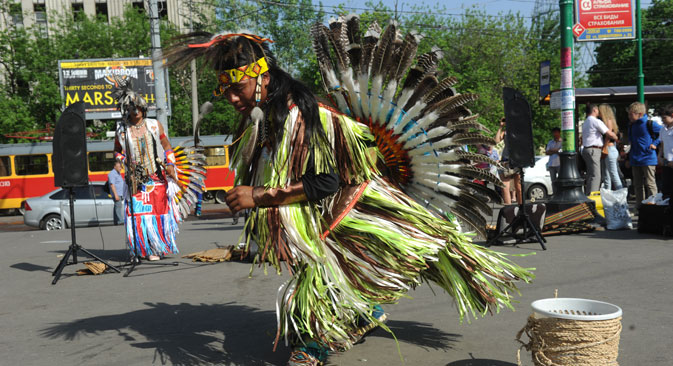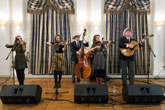El Condor Pasa: Bringing the music of the Andes to the streets of Russia

'Guys from Camuendo' perform the original music of the indigenous peoples from Latin America. Source: RIA Novosti / Kirill Kallinikov
For several years now, the sight of groups of South Americans in colorful costumes playing folk music outside subway stations has been a sign of the summer in large Russian cities such as Moscow and St. Petersburg. In the Russian capital, about 50 such ensembles operate on the city streets during the warm season.
The performance in front of Moscow’s Partizanskaya subway station traditionally gathers a lot of viewers. Some stop by on their way to the park, others on their way to their hotel. The crowd includes a lot of local residents who love the melodic sounds of South American indigenous music. While the musicians play, I talk to a Russian girl named Yulia – the only Russian-speaking member of the collective.
“I don’t perform, I just help the guys get around,” says Yulia, who declined to give her surname. “None of them speak Russian, so I take care of everyday issues: help them buy groceries or navigate the transportation system. However, they have adapted quite well over the three years they have spent in Russia and can get around fine without me.”
Universal themes in Quechua and Spanish
The first Ecuadorian musicians appeared in Moscow in 2010, and their numbers increased dramatically after Russia abolished visas for citizens of Ecuador in 2012. Almost all Ecuadorian performers are from Otavalo, the country’s capital of traditional crafts and music, which is located 80 kilometers north of Quito. The indigenous population of Otavalo is descended from the Incas, which makes their culture interesting not only for tourists who visit Ecuador, but for residents of other countries as well.
According to Yulia, the Russian public can often understand the message of the songs and relate to the main characters. “In general, the songs are performed in the Quechua language, though some are performed in Spanish. The performers sing about life - work, love, a person’s everyday struggle. These are themes that everybody can relate to, they are not difficult to understand. Moreover, the music itself is melodic and magical; people can’t help but be touched by it,” she says.
“Still, it can be difficult to work in Russia because there are a lot of drunk people who can be a distraction from the performance. Besides that, there are occasionally people who will shout ‘Get out of here! You’re not welcome!’ But this doesn’t happen often. I don’t understand how you can dislike this music.”
Yulia first got acquainted with the culture when she was working for a publishing house in Moscow. She started learning Spanish and accidentally met a group of artists from Ecuador. She has now been in a civil union with one of the musicians for three years and accompanies the group to all of its concerts.
“I never thought that I would be traveling around Moscow and other cities with musicians and spending entire days standing around and listening to their music. I have been listening for three years – on my computer, on my phone, in the car – and I haven’t grown tired of it,” she said.
Three years in Russia
After the concert is over, I finally get a chance to talk to one of the musicians - Luis Umberto Santilyan, 29, who was born in Otavalo.
“Our band is called Camuendo Wuambrakuna, which means ‘guys from Camuendo’,” says Santilyan, who explains that the group’s performances are a chance for people to hear the original music of the indigenous peoples from Latin America and learn more about its culture, as well as pick up traditional hand-made souvenirs.
“Our songs are about our surroundings and our concerns. Our music cannot be taught; I just picked up an instrument one day and the music came to me,” adds Santilyan, who says that Russia now feels like home and that he has no plans to leave.
“Before we came to Russia, our group performed in different European countries, including Germany and Italy. I have been here for three years and I am used to Russia, I like it here. I would like to stay here,” he says.
Listen to and read more about Russian music with our podcast Balalike it!
All rights reserved by Rossiyskaya Gazeta.
Subscribe
to our newsletter!
Get the week's best stories straight to your inbox


